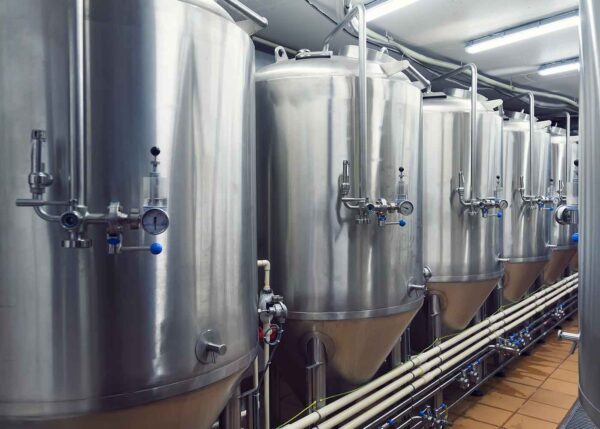01. Asbestos Use at Brewing Companies
How Was Asbestos Used at Brewing Companies?
Asbestos was often used in the brewing industry for filtering impurities from alcohol. It was also found in the insulation of brewing equipment and construction materials in older buildings at breweries.
Asbestos exposure can cause many diseases when fibers are inhaled or ingested.
Asbestos Filters in Breweries
Asbestos filters were used in breweries to remove impurities from the beverages. The mineral was added to the paper filters to enhance their durability. Less commonly, pure carded asbestos fibers were used in beer and wine filtration.
These filtration materials were used in many industries, from pharmaceuticals to beverages.
In the early 1970s, 900 metric tons of asbestos were used annually for filtration. By 1979, 90 metric tons of asbestos were used to make filters.
Some filters contained as much as 50% chrysotile asbestos. Asbestos-containing filters often wore out from continued use. As a result, the filters required frequent replacement, sometimes as much as 100 times per day. Pure carded asbestos fiber filters required replacement after each use.
When replacing filters, workers and bystanders were at risk of inhaling or ingesting asbestos fibers.
Reach of Asbestos Filter Usage
Asbestos filters were used in filtering beer, wine and other distilled spirits. U.S. Environmental Protection Agency (EPA) documents show asbestos filters were used in these industries as recently as 1979. According to the EPA, in 1979 asbestos was used in varying percentages of active breweries, including:
- 30% of wine producers
- 10% of beer producers
- 25% of other distilling producers
These filters were actively used until at least 1980. Now, breweries in the United States use other materials for filtration.
People may still be exposed to asbestos products at brewing facilities today. Old asbestos may remain in historic brewery buildings and equipment. This asbestos poses a health threat if it becomes airborne. Inhaling or ingesting asbestos can lead to serious health risks, such as mesothelioma cancer.
02. Notable Brewing Companies
Notable Brewing Companies That Used Asbestos
Many brewing companies used asbestos products for various purposes. This included filtering beverages, insulating equipment and reinforcing building materials.
This asbestos use may have exposed many people, including consumers and workers. Exposure of any amount can lead to asbestos diseases, such as lung cancer, asbestosis or malignant mesothelioma.
Anheuser-Busch
Anheuser-Busch was founded in 1852 in St. Louis, Missouri by George Schneider.
Schneider was a German American brewer and saloon operator.
Anheuser-Busch is now a part of AB InBev, a multinational drink company with more than 600 beer brands in 150 countries.
There are 12 Anheuser-Busch breweries in the U.S. The company’s Williamsburg, Virginia location has had legal troubles related to asbestos.
In 1976, the Williamsburg brewery was expanding. The construction exposed the building’s hot water system, which was insulated with asbestos. Court records from an employee exposure lawsuit revealed asbestos-containing materials “collected on the floor until swept up either during the day or at the end of the day.”
Many other Anheuser-Busch buildings may contain asbestos products. These products may be exposed during construction, renovation or demolition.
Potosi Brewery
Wisconsin’s Potosi Brewery was founded in 1852 and operated continuously for 150 years. The brewery building underwent several additions over the decades of operation. Some of these additions incorporated asbestos construction materials.
These materials could have exposed brewery workers and visitors to carcinogenic asbestos fibers.
In 2003, the village of Potosi received funding to demolish the brewery building. During the demolition, asbestos was confirmed in several locations, including in:
- Roofing materials
- Adhesives on the walls and ceiling surfaces
- Insulation surrounding brewing equipment
The hazardous materials have since been removed. However, many individuals could have been exposed to asbestos at Potosi Brewery worksites.
Other Brewing Companies That Caused Exposure
Individuals may have been exposed to asbestos in brewery buildings, equipment or by drinking asbestos-filtered beverages.
Asbestos can be found in breweries built before 1980 in cement, insulation and other common construction materials.
More than 100 brewing companies that used asbestos are listed below by state.
03. Who Is at Risk?
Who Is at Risk of Exposure at Brewing Companies?
Asbestos use in breweries may have exposed beverage consumers, brewery visitors, brewery workers and their families.
Filters containing asbestos may have deposited the mineral into brewery beverages. A 1982 EPA report examined fiber release from various asbestos products. The report documented one study that examined 42 different types of wine before and after the asbestos filtration process. Fifteen of these samples were “significantly positive for chrysotile asbestos.”
Ingesting asbestos can put individuals at risk for asbestos diseases, especially those of the abdomen. This could include peritoneal mesothelioma, which affects the lining of the abdomen.
British researchers also found asbestos ingestion, especially from beer consumed before 1980, could be a risk factor for esophageal adenocarcinoma. This cancer develops in the cells lining the esophagus. The researchers noted the incidence of asbestos-caused esophageal adenocarcinoma should subside by 2050. Like many asbestos-related diseases, the cancer has a long latency period.
Asbestos-filtered beverages are not the only exposure risk from breweries.
Those who work in breweries are also at risk of developing mesothelioma or other asbestos-related diseases. The continued exposure can occur due to old filtration processes or from the structural use of asbestos.
Brewers, engineers and maintenance staff are still at risk of occupational asbestos exposure today. Workers who face occupational exposure may unwittingly bring home asbestos fibers to their loved ones. This secondary asbestos exposure can leave family members at risk for asbestos diseases.
Federal agencies such as the Occupational Safety and Health Administration (OSHA) have created laws and regulations to protect workers and the public from dangerous exposure. Despite these laws, however, many individuals are still at risk of asbestos exposure from breweries.
Even brewery tours of old buildings may result in exposure from any damaged asbestos materials inside.
04. Asbestos Lawsuits
Asbestos Lawsuits and Compensation
Individuals may develop an asbestos disease as a result of exposure related to brewing companies. When exposure leads to health issues, patients have legal rights and may be eligible to seek compensation from the liable asbestos company.
Asbestos compensation can come in many forms, including settlements, lawsuit verdicts or trust fund claims. An experienced mesothelioma lawyer can help decide which option is right for each unique situation.
Breweries that used asbestos have been named in many mesothelioma lawsuits. However, because the breweries often did not manufacture the asbestos products, they are not always liable for the exposure.
Depending on the asbestos exposure scenario, employees may sue the brewing company or a product manufacturer. In cases where the brewing companies aren’t liable, victims may still have viable claims against manufacturers.
Legal cases involving asbestos exposure at breweries include:
- An insulation contractor working at the Williamsburg, VA Anheuser-Busch brewery. The insulator was exposed to asbestos-insulated hot water pipes during a renovation project. He brought a case against his employer, the insulation company Caudle-Hyatt, Inc.
- A maintenance mechanic was exposed to asbestos-containing pumps, gaskets, packing and insulation at the Schlitz/Stroh Brewery in Winston-Salem, Oregon. The mechanic brought a case against the pump manufacturer, Aurora Pump Company.
These cases demonstrate how workers may experience life-threatening asbestos exposure at breweries.
A mesothelioma law firm can help individuals build a successful case to hold asbestos companies accountable.




